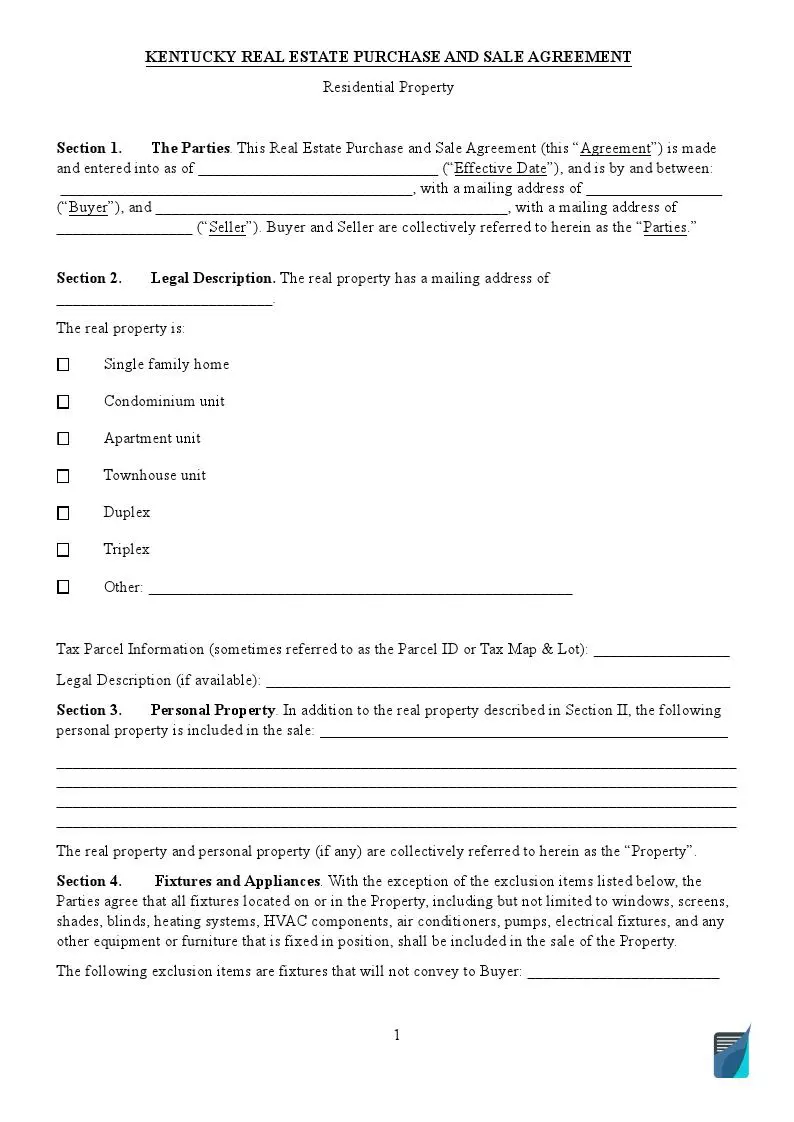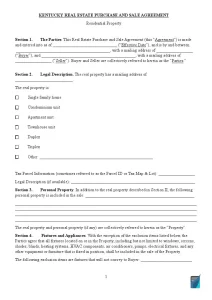Kentucky Real Estate Purchase Contract
If you decide to sell or purchase a piece of real property you own in Kentucky, you should ensure that your deal is safe and prepare massive paperwork. There is one essential form called the Kentucky Real Estate Purchase Agreement among all documents you might need. It is applicable if you transfer or get premises for both residential and commercial purposes.
Usually, these documents contain many pages and cover all the conditions, terms, and features of the sale deal. In a well-made fillable purchase agreement template, you will probably see around ten pages of text. We will now tell you more about such contracts in the state of Kentucky, explain the basics, and provide you with some laws you should know and disclosures you should prepare if you participate in real property deals. Our review is helpful for people who deal with both commercial and residential real estate sales.
If you are not sure that you understand the term “disclosures,” they are mandatory forms that must be provided by one of the parties, usually the seller. They reveal additional information about the property that every buyer should be aware of. In most cases, it is illegal to complete a real property sales transaction without the demanded disclosures. However, their list varies from state to state in the US.
So, step by step, we will define the requirements for residential real property agreements, necessary things to include in commercial real estate contracts, and disclosures parties should pass alongside arrangements of both types.

Build Your Document
Answer a few simple questions to make your document in minutes
Save and Print
Save progress and finish on any device, download and print anytime
Sign and Use
Your valid, lawyer-approved document is ready
Kentucky Residential Purchase and Sale Agreement
As you may know, this document is critical in every sales deal that involves real estate. Because you are not the first and the last to ever sell or buy real property in Kentucky, you should not worry about the contract’s structure. People have been developing it for years, and we are now in a period when we have many great samples that you can use and adapt for your needs.
Before you download any form online and ask another party to sign it, please check the critical details you must add to your Kentucky Real Estate Purchase Agreement for residential premises. Believe us, neither you nor the other party wants to sign the form without any of the following:
1. The Vendor’s and Purchaser’s Names
As in plenty of legal forms and contracts, you cannot sign the document without knowing the responsible or interested parties. It is also common to write each party’s address with the county and state in real estate purchase agreements. If one party is an entity, it is still vital to write its name and address in the contract.
2. The Date of Signing
It is a formal requirement for almost all legal forms. The current calendar date put in the agreement proves the deal has occurred on a specific day. Remember to date your real estate purchase agreement when signing it.
3. The Estate’s Location And Type
It is impossible to create such a form without including information about the property’s full address and type—whether it is an entire building, a condominium, a triplex, or any other kind. The estate’s ID is also required. These details help to identify the property in question for all to whom the contract may concern. If any additional estate is sold with the real estate, add what is sold to the form.
4. Earnest Money Paid by the Buyer
Another name for this is an advance payment. In most cases, buyers pay something in advance to ensure that the property will be theirs. In the contract, parties must indicate the sum paid and the payment date.
5. The Estate’s Price and Payment Schedule
Every real estate purchase agreement reveals the price. If the purchaser cannot pay all at once, a schedule that points out certain payment days and amounts should be inserted. Payment methods must be specified as well.
6. Disclosures
A list of provided disclosures has to be presented in the agreement.
7. Terms
All conditions that parties have agreed on must be added to the template.
8. Signatures
Without both parties’ signatures, the contract is invalid. So, the buyer and seller must ensure that both signatures are in place. The dates and parties’ names should be duplicated there.
Most of the laws that regulate property matters in Kentucky are incorporated in Title XXXII of the Kentucky Revised Statutes. Also, some provisions about disclosures and real estate specialists are added to Title XXVI, Chapter 324.
Kentucky Commercial Purchase and Sale Agreement
When selling or purchasing commercial property in Kentucky, it is critical to indicate which purposes it will serve. Whether it is an industrial, office, mixed-use, or any other property, still, there are some important points to add to any contract. Most of them coincide with those we have already mentioned when describing residential agreements.
Besides all the basics mentioned above, you should add the inspection period information to your form and all conditions applicable for commercial properties. The inspection period allows buyers to visit the estate and see if it fits their demands.
Required Seller Disclosures in Kentucky
Now that you know what disclosures are and why they are needed, we will provide you with a list of such forms required in Kentucky when you participate in real estate transactions. In Kentucky, the list is not very long, especially compared to other states’ requirements. Check it out below to ensure that you have prepared all the forms. Besides the disclosure name, you will also see the law section to read and make everything correctly.
Residential Property
There are only two irreplaceable disclosures for residential real estate in Kentucky. If you sell your property there, remember to provide these forms to your buyer.
- Disclosure about Lead-Based Paint
In most American states, all sellers must disclose their estate buyers if the estate was built before 1978. The reason behind such measures is the possible trace of lead in the property’s paint, named hazardous after many homeowners and builders used the paint. This disclosure is described in the US Code, Title 42, Section 4852d.
If you are the buying party in the deal and still unsure when the building appeared, you can consult the local assessor to find out the exact year and avoid problems related to lead in the paint.
- Seller’s Disclosure of Conditions
By Section 324.360 of the Kentucky Revised Statutes, a seller must fully disclose the property’s state and flaws to a buyer. Particularly, sellers must tell about the property’s roof and basement state and leaks (if any), water supply and sewage service sources and conditions, land, house systems, and other things that might be vital for a new owner. You can complete the official Form M105 to make full and proper disclosure.
Commercial Property
Currently, there is no need to provide any disclosures in Kentucky when you sell a piece of commercial real estate. However, a potential purchaser can inspect your place and ask all questions they consider appropriate. You might need to answer the same questions we have listed above.
